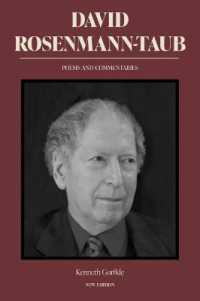- ホーム
- > 洋書
- > ドイツ書
- > Humanities, Arts & Music
- > Arts
- > photography
Full Description
Between 1913 and 1933, Modernist composers' exploration of cinema reached such a degree of pervasiveness and consistency as to become a true aesthetic paradigm, a paradigm that sat at the very heart of the Modernist project.








